- +92 333 1127834
- info@courtmarriageinlahore.online
Court Marriage in Pakistan: Privacy and Simplicity of Court Marriage
Introduction to Court Marriage in Pakistan
Court marriage in Pakistan represents a growing trend among contemporary couples seeking to embrace a more private and straightforward matrimonial process. As a departure from traditional weddings, which are often characterized by elaborate ceremonies, extended family involvement, and substantial expenses, court marriages provide an alternative that is both discreet and legally binding.
In the context of Pakistani culture, marriage is typically viewed as a significant societal and familial event. Traditional marriages often involve various pre-wedding customs, grand receptions, and numerous guests, reflecting the community’s collective ethos. However, these conventions can sometimes impose challenges, including financial strain and logistical complexities, prompting couples to look for simpler options.
Moreover, the increasing influence of modern values and the desire for personal autonomy are pivotal factors contributing to the popularity of court marriages. For many couples, the appeal lies in the ability to formalize their union with minimal public attention, thus safeguarding their privacy. This shift is particularly pertinent in a society where marital decisions can often come under public scrutiny and familial pressures.
The process of court marriage in Pakistan is straightforward and expeditious, involving the fulfillment of certain legal requirements and the presence of witnesses to ensure the marriage’s validity. By streamlining the process, court marriages offer couples the opportunity to celebrate their commitment in an intimate and dignified manner, devoid of unnecessarily cumbersome rituals.
Overall, the rising inclination towards court marriages delineates a significant cultural evolution in Pakistan, indicating a move towards more personalized and pragmatic approaches to marriage. This trend not only underscores a shift in societal attitudes but also highlights the growing emphasis on individual choice and privacy in matrimonial affairs.
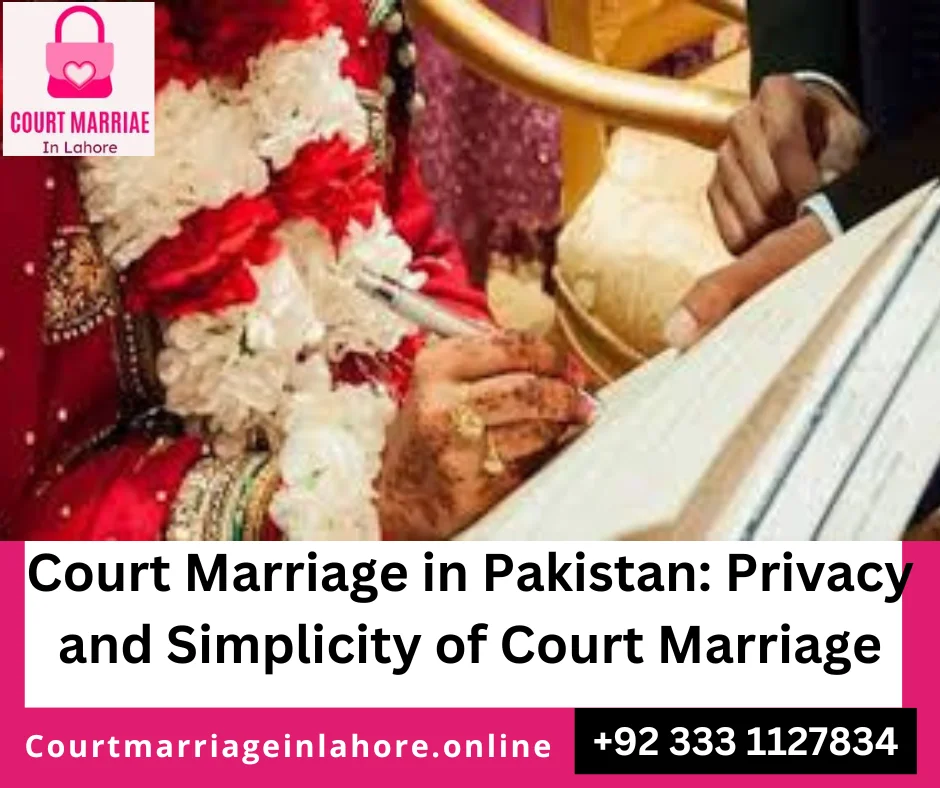
Legal Framework and Requirements
The legal framework governing court marriages in Pakistan is designed to offer a streamlined and private alternative to traditional wedding ceremonies. The process is underpinned by several key legal statutes and requirements to ensure that the marriage is valid and recognized by the state.
One of the primary legal prerequisites is the age of consent, which is 18 years for both males and females. This stipulation is in adherence to the Child Marriage Restraint Act, which seeks to prevent early and potentially coercive marriages. In addition to meeting the age requirement, both parties must provide their original Computerized National Identity Cards (CNICs) as proof of identity and age.
Another crucial requirement is the documentation proving the single status of the individuals. This can be demonstrated through an affidavit stating that both parties are unmarried, divorced, or widowed and thus eligible for a new marriage. These affidavits are essential for court marriage in Pakistan to prevent cases of bigamy or other legal issues.
The presence of witnesses is also a legal necessity. Typically, two adult Muslim witnesses, preferably with valid identification, are required to attest to the marriage. This attestation forms part of the official record, ensuring both transparency and accountability in the process of court marriage.
The Family Court plays a pivotal role in officiating court marriages. Governed by the Muslim Family Laws Ordinance, the Family Court is responsible for ensuring that all legal requirements have been met and that the marriage is conducted legally. The ordinance outlines various aspects of marriage, including the Registrar’s responsibilities and the procedures for recording the marriage in the official registers.
These legal provisions collectively ensure that a court marriage in Pakistan is not only straightforward but also compliant with the country’s legal and religious frameworks, thus guaranteeing marital rights and protections for both parties involved.
Step-by-Step Process of Court Marriage
Understanding the step-by-step process of court marriage in Pakistan is essential for couples seeking an efficient and straightforward path to legal union. The procedure, while systematic, ensures that all legal formalities are met, allowing couples to embrace their commitment officially and with minimal hassle.
Initial Preparations: The first step in the court marriage process involves ensuring that both parties meet the legal requirements to marry. This includes reaching the legal age for marriage, which is 18 for women and 21 for men under Pakistani law. Additionally, both individuals must be free from any existing marital obligations. Consent of both parties is paramount, as coerced marriages are not permitted.
Filing of Necessary Documents: The next step involves the preparation and submission of requisite documents. Couples need to provide identification documents such as computerized national identity cards (CNIC), and recent passport-sized photographs. Furthermore, if one or both parties have been previously married, they must present a valid divorce certificate or the certificate of death of the former spouse. An affidavit stating the intent to marry and the absence of legal impediments is also required.
Appearance Before the Magistrate: Following document submission, the couple must appear before a magistrate or a marriage registrar. This appearance is an integral part of the court marriage in Pakistan, as the magistrate will verify the authenticity of documents, ensure the voluntary consent of both parties, and conduct a brief interview to confirm the mutual agreement to marry. Witnesses, usually two from each side, are required to be present during this stage to attest to the marriage agreement.
Obtaining the Marriage Certificate: Upon successful verification, the magistrate will officially register the marriage and issue the marriage certificate. This certificate, known as the Nikah Nama, serves as a legal document certifying the marriage. It includes details such as the date, place of marriage, names, and signatures of the officiating person, witnesses, bride, and groom.
By comprehensively following these steps, couples can seamlessly navigate the court marriage process, ensuring their union is legally recognized whilst maintaining privacy and simplicity.
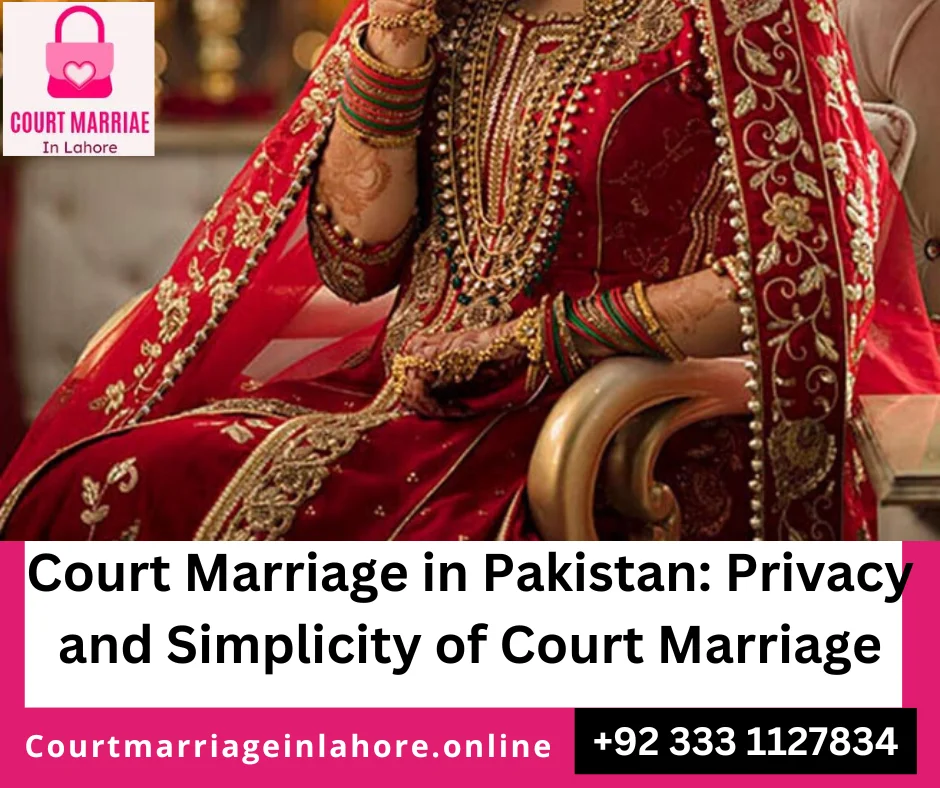
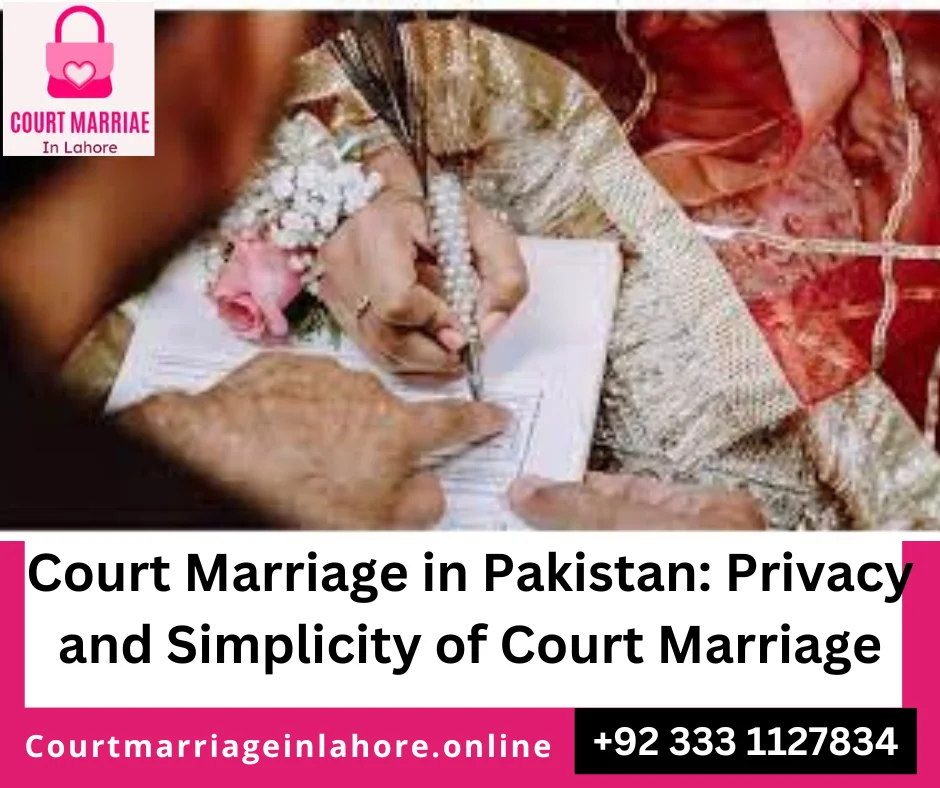
Benefits of Court Marriage
Opting for a court marriage in Pakistan presents numerous advantages over traditional ceremonies. One of the most prominent benefits is privacy. Court marriages provide a private setting where couples can legally solemnize their union without the prying eyes of society. This is particularly beneficial for couples seeking a low-key affair, free from societal scrutiny and judgments.
Another significant advantage is simplicity. Traditional marriages often require extensive planning, elaborate ceremonies, and multiple events. In contrast, court marriages are straightforward, requiring minimal arrangements and fewer formalities. This simplicity not only reduces the stress associated with wedding preparations but also ensures that the marriage process is efficient and hassle-free.
From a financial perspective, court marriages are remarkably cost-effective. A traditional wedding can be an expensive affair, with costs escalating due to venue bookings, catering, attire, and other miscellaneous expenses. Court marriages, however, involve minimal costs, primarily linked to administrative fees and legal documentation, making them an economical choice for many couples.
Legal protection is another crucial benefit of opting for a court marriage in Pakistan. When a marriage is registered in court, it ensures that the union is officially recognized by the state. This legal acknowledgment provides couples with various rights and protections, thereby safeguarding both parties in case of any future legal disputes.
Moreover, court marriages allow couples to avoid societal pressures and family conflicts. In traditional settings, weddings are often influenced by familial expectations and societal norms, which can sometimes lead to conflicts and stress. A court marriage offers couples the autonomy to make decisions independently, without external interference, fostering a more harmonious relationship from the outset.
Challenges and Considerations
While opting for a court marriage in Pakistan can offer privacy and simplicity, couples may encounter several challenges and considerations along the way. One significant issue is social stigma. In a society where traditional wedding ceremonies are deeply ingrained, choosing a court marriage might be perceived as unorthodox or unconventional. This perception can lead to unwarranted judgment or gossip, potentially affecting the couple’s social standing.
Another considerable challenge is family opposition. Many families in Pakistan place a high value on elaborate wedding celebrations, viewing them as a marker of social status and familial pride. Opting for a court marriage can sometimes be met with resistance or disapproval from parents and extended relatives. This disapproval can create emotional strain and lead to conflict within families. For couples, navigating this opposition requires patience, effective communication, and sometimes, a willingness to compromise.
An additional consideration is the emotional implications of forgoing a traditional wedding ceremony. Weddings are not only about legal formalities but also about celebrating love and unity with friends and family. Choosing a court marriage might leave couples feeling as though they missed out on these joyous moments and communal blessings. Reflecting on what is most important to them can help couples navigate these feelings and find alternative ways to celebrate their union, perhaps through a small gathering or a reception at a later date.
Advice for couples considering court marriage in Pakistan includes open communication with family members to express their reasoning and intentions clearly. Seeking support from like-minded friends or counseling services can also be beneficial in managing familial and emotional aspects. Ultimately, the decision to opt for a court marriage should align with the couple’s personal values and circumstances, ensuring that they embark on their marital journey with mutual understanding and respect.
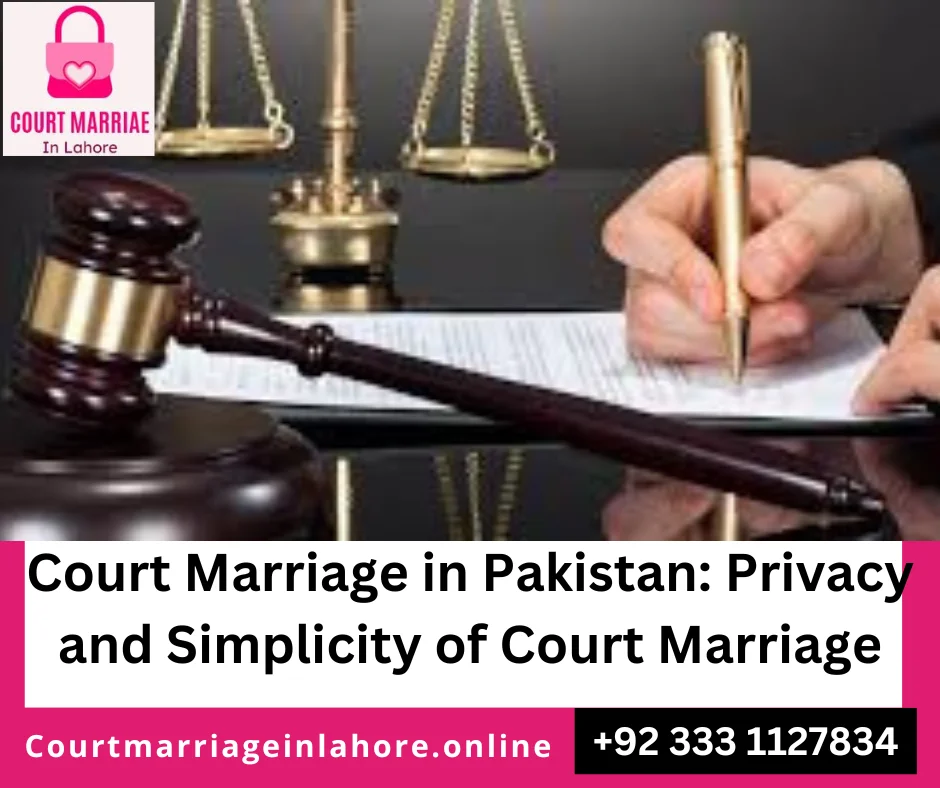
Privacy and Confidentiality in Court Marriages
Court marriage in Pakistan offers couples a unique opportunity to celebrate their union in a private and confidential manner. Unlike traditional weddings, which often come with elaborate ceremonies and extensive guest lists, court marriages prioritize simplicity and personal discretion. This approach appeals to many couples who prefer to keep their relationship away from public scrutiny and the pressures often imposed by societal expectations.
One of the primary reasons couples opt for court marriage in Pakistan is the assurance of privacy. The very nature of the court marriage process ensures that only the essential participants, namely the bride, the groom, and their witnesses, are involved in the proceedings. This limited exposure reduces the chance of unsolicited opinions and judgments from the wider community, providing couples with a safe space to make their union official without external interference.
Furthermore, the legal framework that governs court marriages in Pakistan guarantees a level of confidentiality that is unmatched by traditional wedding practices. The legal documentation involved in a court marriage is securely handled by the authorities, ensuring that personal details are protected. This legal safeguarding is crucial for couples who may face familial, societal, or even political challenges that could arise from a publicized marriage.
Moreover, court marriages allow couples to maintain their autonomy by omitting many of the rituals and social obligations required in conventional weddings. This autonomy empowers individuals to focus on their relationship and the legal aspects of their union, rather than appeasing extended family expectations. The streamlined procedure of court marriage in Pakistan, facilitated in a judicial setting, emphasizes legality and formality over pomp and circumstance.
In essence, the confidentiality and privacy offered by court marriages not only simplify the legalities involved in registering a marriage but also foster a more controlled and intimate environment for the couple. By choosing this path, couples can ensure their bond is celebrated and recognized in a manner that aligns with their personal values and needs, free from external pressures and intrusions.
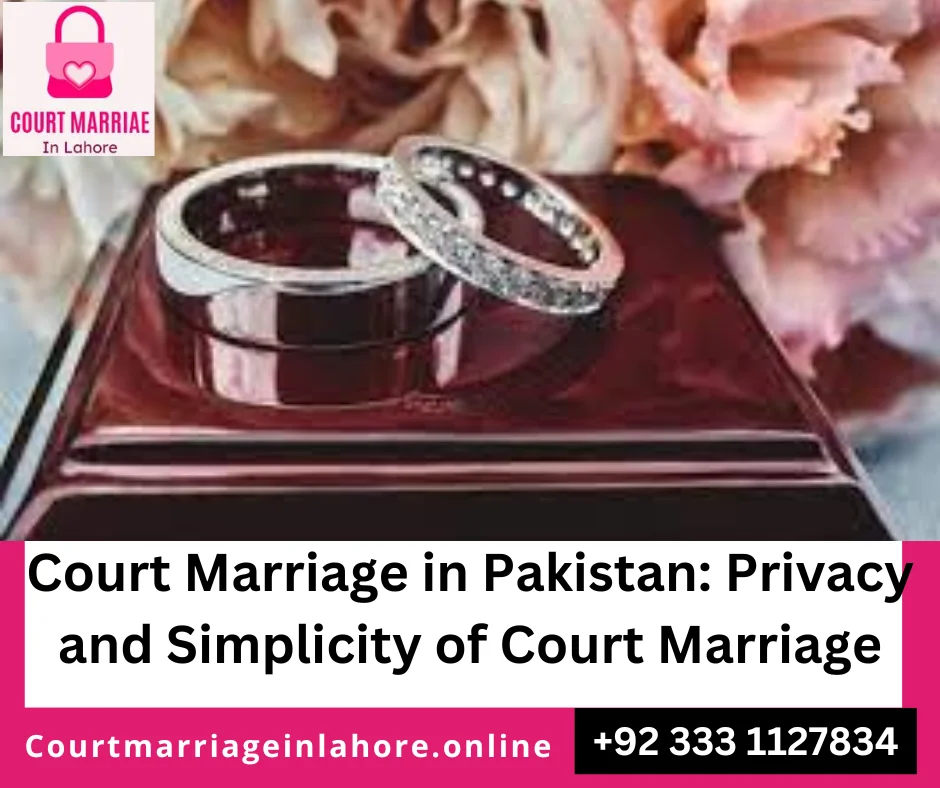

Case Studies and Real-Life Examples
Various couples across Pakistan have chosen to walk the path of court marriage, motivated by a myriad of reasons. Their stories, though unique, share a common thread of seeking privacy, simplicity, and legal validation. These real-life examples provide insight into their journeys and underscore the benefits of opting for court marriage in Pakistan.
Take the case of Ayesha and Ahmed, a couple from Karachi. Faced with familial pressure to have an extravagant traditional wedding, they opted for a court marriage to avoid the financial strain. Their decision allowed them to focus on building a solid foundation for their marriage without the added stress of organizing a large event. The straightforward process of court marriage in Pakistan enabled them to secure their union legally and start their married life on their own terms.
An important illustration comes from Noor and Salman, who hailed from different religious backgrounds. Their court marriage not only assured legal acknowledgment but also safeguarded their union against any socio-cultural backlash. The legal framework provided by court marriage in Pakistan afforded them the protection and recognition necessary to navigate their unique challenges. It also allowed them to continue their professional lives smoothly without interruption.
Similarly, Zara and Bilal chose court marriage to steer clear of the complexities involved in traditional wedding negotiations. From the moment they made the decision to the moment they were legally married, the entire process was succinct and devoid of unnecessary complications. This efficiency of court marriage in Pakistan gave them both peace of mind and a streamlined approach to legal union, giving them more time to devote to other aspects of their relationship.
These instances not only reveal the diverse motivations behind opting for court marriage but also highlight how this form of matrimonial alliance can prove advantageous. Whether driven by economic considerations, cultural complexities, or a quest for autonomy, the simplicity and privacy offered by court marriage in Pakistan provide a viable and often rewarding alternative.
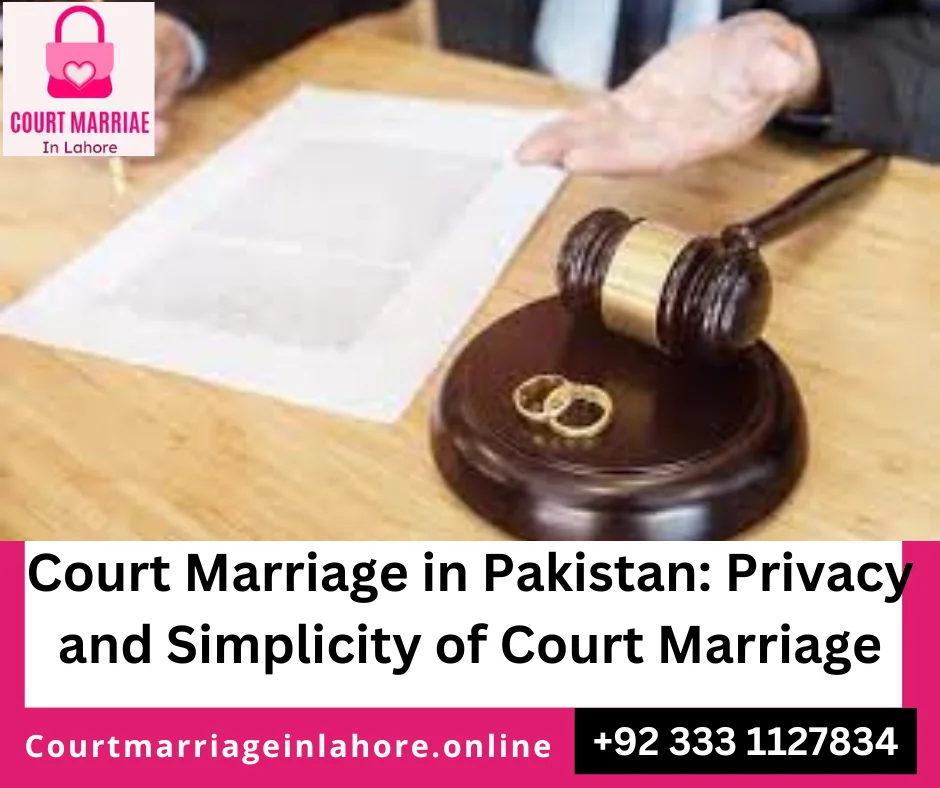
Conclusion and Final Thoughts
Court marriage in Pakistan presents an advantageous path for couples seeking privacy and simplicity. Throughout this blog post, we’ve explored the practical and procedural aspects central to this method of solemnizing marriage. Opting for a court marriage enables couples to avoid the complexities often associated with traditional marriage ceremonies. It provides a more controlled environment, free from undue familial or social pressures, and adheres to the legal framework stipulated by Pakistani law, ensuring that the union is recognized officially.
One of the major benefits of court marriage is its confidentiality. Couples can enjoy a significant level of privacy, as the process circumvents the elaborate rituals and large gatherings that typically accompany traditional weddings. Additionally, the simplicity of the court marriage process in Pakistan makes it accessible and straightforward, minimizing stress and logistical concerns.
For those who value a quick, efficient, and legally binding union, court marriage is an exemplary choice. It respects the couple’s autonomy and allows them to focus on what truly matters—their commitment to each other. As societal norms evolve, the choice of marriage ceremonies too becomes diverse, and court marriage stands out as a modern, respectful alternative.
We invite our readers to reflect on the merits of court marriage in Pakistan. Whether you are considering this option or have already gone through the process, your insights and experiences are invaluable. Please share your thoughts or stories in the comments below, fostering a community of shared knowledge and support for others navigating the path of court marriage.
